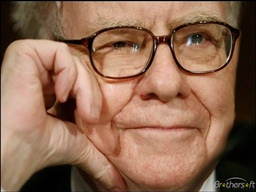Having come from the investment world, I like to stay informed and keep my eye on what people are seeing and thinking about prospects for growth and where the world is going. For that reason, I always find reading Berkshire Hathaway’s annual report written by Warren Buffett very informative, down to earth, and a balancer to all the hype and exaggeration about how bad things look out there. The world is not ending, even though it is going to be a hard road for many.
 We have been overwhelmed by the reports and video’s coming from Japan. So many people are carrying heavy hearts for what the Japanese people are experiencing, and will continue to experience as they rebuild their lives and their homes. We all wish major blessings and much inner strength to all of Japan, and to our EO friends over there, to help them get through these tough times.
We have been overwhelmed by the reports and video’s coming from Japan. So many people are carrying heavy hearts for what the Japanese people are experiencing, and will continue to experience as they rebuild their lives and their homes. We all wish major blessings and much inner strength to all of Japan, and to our EO friends over there, to help them get through these tough times.
A few weeks back, before this tragedy, Mr. Buffet made some interesting comments in his report, which happen to be very appropriate for hard times, be it the state of the US Economy, a natural disaster or personal crises. He started with commenting on how over the span of his life living standards have increased over 6 times. He followed with “The prophets of doom have overlooked the all-important factor that is certain: Human potential is far from exhausted, and the American system for unleashing that potential – a system that has worked wonders for over two centuries despite frequent interruptions for recessions and even a Civil War – remains alive and effective.”
I agree with this wholeheartedly and know that this applies not just to America, but everyone participating in the world capitalist economy. Japan dealt with the mass destruction of WWII and nuclear attacks, to become the 2nd largest economy in the world (now 3rd). The Japanese people have shown a very high consciousness deal with this crisis, and with all the human potential they possessed getting it done before, they can do it again.
Other observations in his report had to do with the future prospects of companies to create intrinsic value. He focuses on 2 areas, which he calls the “what-will-they-do-with-the-money” factor and “what-do-we-have-now” calculation. In order for CEO’s to do a good job, they must look at these areas and allocate effectively. Buffett used the example of going back to 1960 and seeing how Sears and Roebuck or Montgomery Ward’s CEO’s allocated capital compared to Sam Walton.
He also talked about how culture counts, and that CEO’s and directors should act like owners. Under the Berkshire system they receive “token compensation: no options, no restricted stock and, for that matter, virtually no cash.” There’s no liability insurance in place either, so if they mess up, they lose their own money as well.
In regards to leverage and debt, Buffett is not a fan of what he calls “financial adventurism”. A lot of people have gotten rich and magnified their gains through the use of borrowed money, but many have also become very poor in the process. Having a large amount of debt in your business can be destructive if the timing of maturity or refinancing comes during a worldwide credit shortage. Buffett is a fan of having lots of cash on hand, this way you always have money to deal with a crisis or take advantage of an opportunity. He keeps at least 10 Billion and usually up to 20 Billion on hand. Cash is King!

